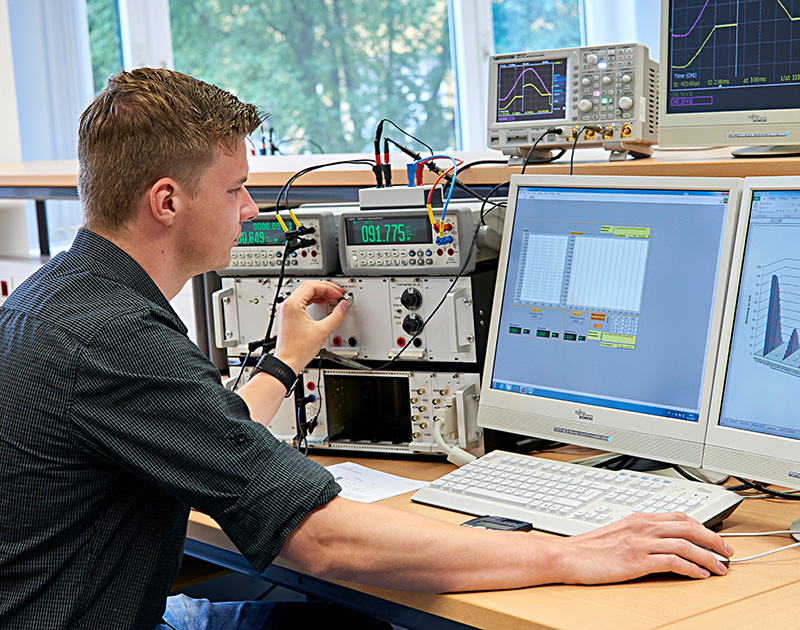
Electrical Engineering and Information Technology
In A Nutshell
Profile
"In principle you can do anything, but without power, almost nothing works." Electrical technology is a fundamental technology of today’s society. Power engineering and information transfer / processing would not be possible without electro-technical procedures. In the electrical engineering and information technology program, students acquire sound skills in electrical engineering, electronics, information and communication technology, signal processing, and hardware of micro-computer technology ("embedded systems"). This enables them to understand special, practice-oriented problems in electronic specialty areas in a short time.
Projects
The program is designed specifically for the requirements of professional practice. Students also work in teams with students from other academic programs, thereby training their social skills. Specific projects with industrial partners challenge the students to present their work results confidently and establish contacts in the profession. In addition, almost all courses are accompanied by exercises in which the students can apply their theoretical knowledge in a practical setting.
Practical Training
Basic internship
A basic internship is not required. However, before the start of the program, we recommend a practical activity in relevant companies, so you can get an idea of the professional work environment ahead of time.
Required internship semester
The required internship semester usually takes place in the fourth semester of the program. It spans a contiguous period of about 20 weeks. In this time, students also attend about two weeks of courses to accompany their practical training.
Structure of the Program

The first program segment (semesters 1-3) serves to refresh knowledge in mathematics, physics, and computer science and delve deeper into additional mathematical / scientific and electro-technical principles. During this phase of the program, we already emphasize practical courses in order to establish a relationship to applications. The subjects of electrical measurement technology, computer science and programming, electronics 1a (elements of electronics), electronics 1b (circuit technology), digital technology, and micro-computer technology contain about 25% of lab work.
The required internship semester takes place during the fourth semester and is completed in industry or public institutions outside of the university. It allows the students to solidify what they have learned and to make connections with potential future employers.
On this solid basis, semesters 5-7 impart the skills that are needed to solve engineering/scientific problems in electrical engineering, electronics, and IT. The program concludes with the Bachelor's thesis. It can be written at the university or external partners in industry or public institutions.
Specialization options
In the second program segment (semesters 5-7), students can select from the following application-oriented specialization subjects:
- HDL system design internship
- Wireless communication 2
- Automotive electronics
- Electromagnetic compatibility
- Computer-based measurement technology
- Production of electronic devices
- Communication systems
- Model-based design procedure
- Digital system integration
- Sensor and actuator technology
- Production technology
Curriculum and Examination Regulations
The [study plan]* provides an overview of the structure of the program. The [module manual]* provides information about the content of the individual modules. The [study and examination regulations]* form the legal basis for the study program. Contact your academic advisor Prof. Dr. Matthias Mörz concerning the content of the program.
*only available in german at the moment
Job Perspectives
The labor market opportunities and earnings potential for well-trained electrical engineers are very good. In the required internship and the industry-based Bachelor's thesis, students can make early connections in the industry. The work areas of graduates range from research and development to production planning, quality assurance, and technical sales in different industries.
The combination of training and academic education make in particular the graduates of the dual program electrical engineering and information technology highly sought after as the managers of tomorrow. The areas in which they work lie in particular in projecting, production planning, and QA as well as operational management.
Master's degree
After completing the Bachelor’s degree, good graduates have the possibility of obtaining further qualifications with a Master's degree. For this purpose, Coburg University offers the following Master’s degrees:
- Electrical Engineering and Information Technology
- Computer Science
- Development and Management in Mechanical Engineering
- Simulation and Testing
These programs continue directly after the Bachelor’s degree.
Application and Admission Requirements
Here you can find all the important information about evaluating your school-leaving certificates and learning German in order to start a bachelor program at the University of Coburg.
Since the program is taught in German, you also have to prove your knowledge in German before the start of studies (level C1/C2).
Status: December 2019.
Further and current informations can also be found on the German website of this course.
